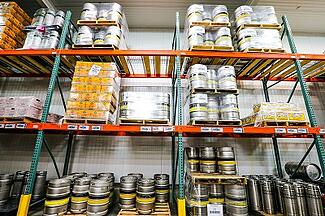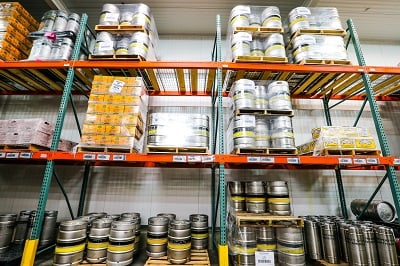As the premier wholesale distributor of craft, domestic, and imported beer in central Minnesota, Bernick's knows our beer! We're the folks who ship, store, and distribute the frosty, delicious beverage to thirsty customers in liquor stores, pubs, restaurants, and more; which means that we're often asked to explain the journey of beer from the brewery to the customer.
Here's a quick overview of everything that Bernick's does to provide fresh, tasty suds to beer lovers!
Pasteurization & Packaging
Once the brewing process is completed, the brewery packages the beer into cans, bottles, or kegs. Most domestic beer (Miller Lite, Miller High Life, etc.) is pasteurized once it's been canned or bottled - a water-bath process that quickly heats the beer to approximately 140 degrees F for about 2-3 minutes. Pasteurization destroys any yeast growth (bacteria) that may be present in the beer, making it possible to safely store the beer at room temperatures for up to 120 days.

Many craft breweries use bottle-conditioning to maintain the quality of the beer. Fermentation allows CO2 to escape, transforming the wort into beer. During bottle-conditional, a small amount of yeast or sugar is added to reactivate the yeast in the beer which creates CO2. The CO2 has nowhere to go once the bottle is capped, so it dissolves back into the beer. Active yeast remains in a bottle-conditioned beer, allowing it to mature ever so slightly over time.
Also, there are also some craft breweries that do not filter their beer. An unfiltered beer contains yeast, proteins, and hop particles which allow the beer to continue developing in the bottle. Leftover yeast allows for natural beer conditioning and the generation of CO2 in the bottle, vs. injecting CO2 before capping.
Draught (keg) beer is rarely pasteurized; to prevent yeast overgrowth (also known as secondary fermentation) kegs must be kept at 38 degrees F. The same rule applies to any unpasteurized bottles or cans of craft beers - they need to be kept cold to ensure the quality taste that the brewer intended.
From Brewery to Bernick's
As soon as the brewery has completed their packaging, the freshly-brewed beer makes its way to our warehouse. We make the freight arrangements in most cases, so that means we have a team of experts here at Bernick’s dedicated to monitoring inventory and taking care of the logistics of getting the beer to our warehouses.
Temperature-Controlled Storage
As soon as our trucks arrive at our warehouse locations, the beer is moved with forklifts into temperature-controlled storage areas where it's carefully inventoried and monitored in compliance with each brewers' unique specifications. Unpasteurized kegs and craft beers are kept at 38 degrees F to deliver optimal taste and freshness, while pasteurized beers are maintained at a temperature that's just slightly cooler than room temp (65-70 degrees F) to protect against both heat and freezing.
Our team of inventory management specialists keep a close eye on all the beer in our warehouses, ensuring proper stock rotation and distribution based on brew dates.
Orders Are Processed, Picked, and Delivered Within 24 Hours
Our reliable, expert Bernick's sales team works with all of our retail partners throughout the sales process; each of our domestic, imported, and craft beer orders are typically processed, picked, and delivered within 24 hours. Meaning you get the freshest brews, every time.
Bernick's Delivers & Collects Payments
As a beer distributor, MN State law dictates that Bernick's is responsible for either collecting payment upon delivery or maintaining a pre-paid delivery account for all our customers. Our delivery drivers work closely with our retailers to ensure proper storage and merchandise rotation so that each beer aficionado can enjoy a fresh, perfectly-preserved can, bottle, or glass of their favorite beer!
To learn more about why Bernick's is the distributor of choice for all the leading domestic, imported, and craft beers brands throughout Central and Northern Minnesota, call or email one of our Bernick's reps today.



